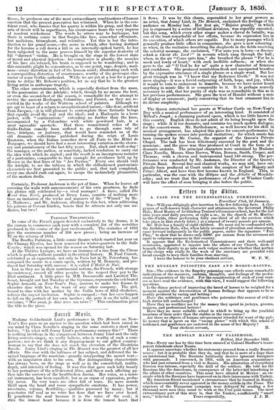arrd
Madame Goldschmidt Lind's performance in The Messiah on New- Year's Eve gave us an answer to the question which had been raised in our mind by Clara Novello's singing in the same oratorio a short time before, "In what will Jenny Lind's performance surpass this ? " There is nailing invidious in the comparison between Jenny Lind and the only living oratorio-singer, we verily believe, who is worthy of such a com- parison; nor do we think it any disparagement to our gifted country- woman to say that she does not reach the elevation of the illustrious Swede. Jenny Lind's singing in The Messiah was the greatest of all her efforts. She rose with the loftiness of her subject, and delivered the in- spired language of the musician—grandly interpreting the sacred text— with an inspiration akin to his own. Her distinguishing characteristic has always been, on the stage as well as in the concert-hall, reality, depth, and intensity of feeling. It was this that gave such lofty beauty to her portraiture of the self-devoted Alice, and threw such affecting pa- thos into the sorrows of the heartbrokenAmine. Her voice, as a musi- cal instrument, has been equalled ; but as an organ of expression, proba- bly never. Its very tones are often full of tears. Its mere sounds thrill upon the heart and rouse sympathetic emotions. It has power, sweetness -volume, flexibility,—qualities possessed by many ; but it penetrates the soul as no voice has done that we have ever heard. It penetrates the soul because it is the voice of the soul ; it stirs the inmost heart because it is from the inmost heart that it flows. It was by this charm, superadded to her great powers as an artist, that Jenny Lind, in The Messiah, enchained the,feelings of the audience on Monday last. Her first air, " Rejoice greatly," in which joy is expressed by a series of brilliant divisions, was superbly executed ; but this song, which every other singer makes a cheval de bataille, was one of the least remarkable of her efforts, because its expression lies in its execution, of which others are capable. But to many passages which generally produce little effect in comparison, she gave a new colouring : as when, in the recitative describing the shepherds in the fields receiving the celestial message, she exclaimed, "For unto you is born—a Saviour which. is Christ the lord !" in accents which rang through the hall ; when, in the air "Come unto him," she breathed the phrase "For he is meek and lowly of heart," with such ineffable softness ; or when she gave to the air "If God be for us" quite a new character of firmness and confidence. She produced numberless fresh and unexpected beauties by the expressive utterance of a single phrase or a single word. But her great triumph was in "I know that my Redeemer liveth." It was not mere singing—it was a fervid outpouring of faith, hope, and joy, which it would be vain to endeavour to describe, because we have never heard anything in music- like it or • comparable to it. It is perhaps scarcely necessary to add, that her purity of style was as remarkable in this as in her previous performances. She gave the text of Handel without a note of display or ornament; jusitly conceiving that its best ornament lies in its divine simplicity.










































 Previous page
Previous page